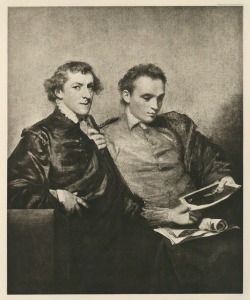John Codrington Bampfylde (1754 – 1797) was born into the powerful and prominent Westcountry family the Bampfyldes of Poltimore House on the outskirts of Exeter. The poet’s name reveals he was not just a son of Poltimore, his mother’s ancestry can be traced to the Codrington Sugar Barons of the Caribbean whose money and power derived from the profits of sugar and slavery.
In 1778 he published Sixteen Sonnets dedicated to Miss Mary Palmer the woman with whom he was hopelessly infatuated, she was the niece of the famous artist and fellow Devonian Sir Joshua Reynolds. Portrait shows George Huddesford and John Codrington Warwick Bampfylde (on the right) by Arthur N. Sanders after Sir Joshua Reynolds mezzotint, (circa 1778) © National Portrait Gallery, London
Amongst these Sixteen Sonnets was Sonnet 8 “On the Abbé Reynall’s History of the Establishments in the East and West Indies”. The sonnet is about a book, 9 Volumes in fact, by the French Enlightenment writer Abbé Guillaume Thomas Raynal (1713 –1796) and his collaborators. Its anti-slavery arguments provoked contraversy in his native France and helped develop the framework for the abolitionist movement in the second half of the eighteenth century. John Bampfylde’s dedication of a sonnet to Raynal indicates his admiration for the French writer and by publishing it, he was nailing his colours to the mast in support of anti-slavery agitation. A decade later in 1788, the poet’s brother Sir Charles Bampfylde MP for Exeter can be seen heading the list of 250 subscribers which appeared in the Exeter Flying Post pledging financial support to The Society for the Abolition of the Slave Trade. See the list of Subscribers in the extracts from Exeter’s Flying Post in the research document by volunteer Di Cooper on Exeter’s Slavery Abolition Movement. More about Poltimore Poet, John Bampfylde by volunteer researcher Miranda Harvey.

